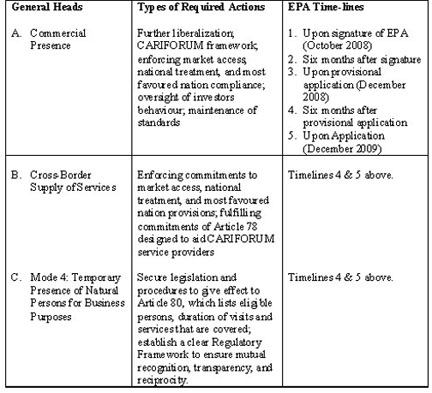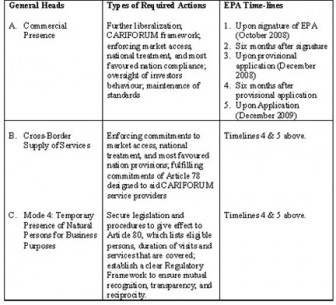Final Instalment
Introduction
This is the third and final part of a short series of articles on the Guyana Coali-tion of Services Providers (GCSP) and Promoting the Services Sector in Guyana. So far, Part 1 has presented 1) a broad introduction to the formation and objectives of the GCSP 2) a short review of the size and composition of the services sector in Guyana, as revealed by the re-based series (2006) System of National Accounts, and 3) a description of Guyana’s services commitments under the WTO-GATs. Part 2 describ-ed membership and related issues; our networking with other services suppliers across CARICOM; and, efforts at resource-generation for the GCSP. Today’s article will focus on considerations affecting the regional and external environment in which Guyana’s services sector has to function.
The CSME
From its very inception the GCSP has relied heavily on support from the CARICOM Secretariat. This support has been readily forthcoming because Guyana, along with twelve other CARICOM countries, had in 2006 committed to the formation of a region-wide single market and economy ― CARICOM Single Market and Economy (CSME). This is being operationalized under the Revised Treaty of Chaguaramas 2001. There are five major components to the CSME, all but one of which directly affects the services sector. These components are: 1) the Free Movement of Services in the CSME area 2) the Right of Establishment of economic activities in Member States throughout the jurisdiction of the CSME 3) the Free Movement of Skilled Com-munity Nationals 4) the Free Movement of Capital, Relat-ed Payments and Transfers and 5) the Free Movement of Goods. Although the last item focuses exclusively on the movement of goods with issues of tariffs and rules of origin taking centre-stage, it should be observed that the movement of goods indirectly correlates to trade in services.
There are several projects being executed under the aegis of the CARICOM Secretariat and its CSME Unit to assess progress on the state of implementation of the CSME in Member States and to make recommendations to overcome any perceived weakness or threats to the process, while building on any manifest strengths and seizing opportunities that might be there. One such appraisal, which is about to be completed is the harmonization and standardisation of administrative practices and procedures in relation to the CSME in Member States; the Guyana leg of the study is almost concluded.
A recent CARICOM Secretariat evaluation has sought to establish 1) The compliance of Member States with their obligations to remove legal restrictions that impede the operation of the CARICOM Single Mar-ket (CSM); 2) whether the administrative infrastructure in Member States are developed enough to enable/facilitate the completion of the CSM; and 3) the challenges facing Member States as they go forward.
As regards (1) the main finding has been that while substantial progress had been made since 2006, this has been very uneven. The “free movement of goods” and the “right to establishment” had progressed much more than the “free movement of services and skilled community nationals”.
As regards (2) the study identified constraints in the provision of human and financial resources; a demonstrable lack of capacity and poor public awareness of the regional efforts toward the formation of the CSM.
As regards (3) several challenges were identified in the study, including, political will, resource capacity, security, as well as other social and cultural considerations, which affected Member States’ involvement in the CSM process.
All these considerations directly impact on the capacity of the services sector in Guyana to develop on the expected basis of the CSME providing a platform or framework for the engagement in regional and international trade in services.
The EPA
Related to these considerations is the situation which has been created by Guyana’s membership in the CARIFORUM-EC, Economic Partnership Agreement, (EPA) 2008. Of major concern to the GCSP is that under the EPA a considerable number of required actions should be taken at both the National and Regional levels according to the timelines of the Agreement. At last count the GCSP has found that scores of actions have fallen due and we were unable to verify whether these have been done at the National or Regional level. Space does not permit a full listing of these actions or a discussion of them, but below Schedule 1 summarizes some of the relevant information. This gives a clear indication of how much more work remains to be done before the services sector is EPA-compliant.
Schedule 1: Past Due Required Actions (National and Regional) of the EPA
Contact Details:
gcsp.services@gmail.com






